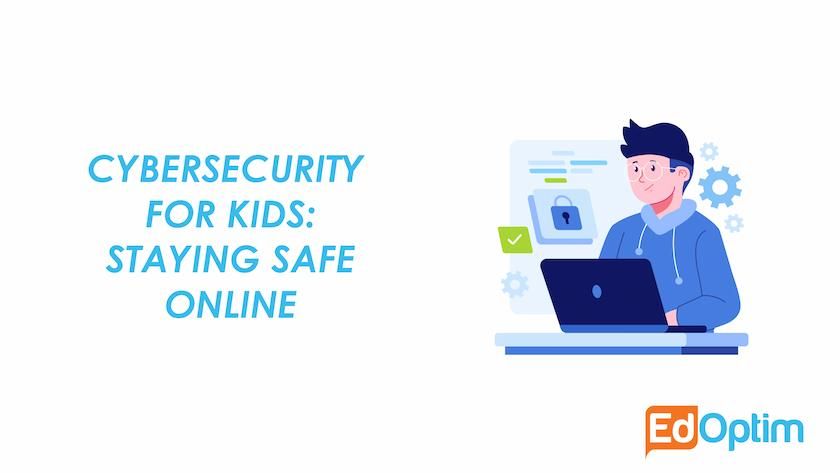Sep 02, 2024 By Team EdOptim *
What is Cybersecurity?
Cybersecurity is the practice of protecting computers, mobile devices, apps, and online information from hackers and cybercriminals. It involves using various tools, like antivirus software and VPNs, to keep personal data secure. For kids, cybersecurity means staying safe while using the internet for schoolwork, social networking, or playing games.
What Are the 5 Cyber Safety Rules for Kids?
Never share personal information: Children should avoid sharing their phone numbers, home addresses, or any personal details online.
Use strong passwords: Encourage kids to create unique passwords for their accounts that are difficult for hackers to guess.
Avoid talking to strangers: Just like in the real world, kids should not engage with strangers online.
Stay away from suspicious links and files: Teach kids not to click on links or download files from unknown sources to avoid malware and phishing scams.
Tell a trusted adult about anything suspicious: If kids encounter inappropriate content or feel uncomfortable online, they should immediately talk to a trusted adult.
How Can I Keep My Child Cyber Safe?
Parental controls: Utilize parental control tools on devices and apps to filter inappropriate content and monitor online activities.
Set up privacy settings: Adjust privacy settings on social media accounts and apps to limit who can view personal information.
Regular conversations: Discuss the importance of online safety with your child frequently, reminding them about the potential dangers of the online world.
Encourage balanced screen time: Promote offline activities to balance screen time, ensuring kids have a healthy relationship with technology.
Use security software: Install antivirus software and other online security tools to protect against malware, spyware, and cyber threats.
What Are the Best Practices for Cyber Security for Kids?
Teach kids about phishing and scams: Explain how scammers use phishing emails or messages to steal sensitive information and how to recognize them.
Monitor online behavior: Regularly check your child’s online behavior and interactions to identify any potential risks.
Install a VPN: Using a VPN can help protect your child’s online activities by hiding their IP address and encrypting their data, particularly when using public Wi-Fi.
Use secure networks: Ensure your home Wi-Fi is secure and encourage kids to avoid using public Wi-Fi networks.
Educate about cyberbullying: Teach kids about the impact of cyberbullying and encourage them to report any such behavior to a trusted adult.
What Are Cyber Safety Sites for Kids?
Websites like FBI’s Safe Online Surfing, NetSmartzKids, and Kids.gov offer interactive games and activities to educate kids on cybersecurity and online safety.
CyberSmart Kids and Common Sense Media provide valuable content, including safety tips and resources, to help kids become responsible digital citizens.
Is Crypto VPN Necessary?
A VPN (Virtual Private Network) can be beneficial in securing online activities, especially when kids use public Wi-Fi networks or access sensitive information. A VPN encrypts data and helps protect against cybercriminals trying to intercept it.
For most home networks, a VPN may not be necessary, but it adds an extra layer of security when kids are using public Wi-Fi, such as in libraries or cafes.
How Do I Teach My Child Internet Safety?
Use stories and analogies: Explain online threats using simple, relatable stories. For instance, cybercriminals can be compared to “digital thieves” who try to steal personal information.
Interactive learning: Utilize apps and games designed to teach children about cybersecurity in a fun and engaging way.
Demonstrate safe practices: Show children how to set up strong passwords, recognize suspicious emails, and use privacy settings effectively.
Set clear rules: Establish rules for safe online behavior, such as no sharing of personal details or talking to strangers online.
How Does Social Media Affect Our Relationships?
Positive effects: Social media can help kids stay connected with friends and family, share their interests, and learn about new topics.
Negative effects: However, it can also expose them to risks such as cyberbullying, inappropriate content, and the pressure to compare themselves to others.
Managing usage: Encourage healthy social networking habits, like limiting screen time and focusing on positive interactions, to maintain a balanced online experience.
How Do I Keep My Kids' Personal Data Safe?
Limit data sharing: Teach kids to avoid sharing their phone numbers, addresses, or other sensitive information online.
Use security settings: Enable privacy and security settings on social media and apps to protect personal data.
Be cautious with public Wi-Fi: Advise kids not to enter personal details or login credentials when using public Wi-Fi.
Monitor app permissions: Regularly check app permissions to ensure that they do not access unnecessary personal data.
Install parental control apps: Use parental control apps to monitor data sharing and protect personal information.
What Age-Appropriate Cybersecurity Tips Should Parents Know for Their Children's Online Safety?
For young children: Focus on basic internet safety rules, such as not talking to strangers and avoiding sharing personal information.
For pre-teens: Teach about the risks of social networking, cyberbullying, and phishing, and encourage safe online behavior.
For teenagers: Discuss more advanced topics like identity theft, online privacy, and the importance of a good digital reputation. Guide them in using tools like VPNs, antivirus software, and privacy settings effectively.
What Are the Top Online Safety Tips for Children Using Social Media?
Use privacy settings: Ensure all social media accounts are set to private to control who can see posts and personal details.
Limit friend lists: Encourage kids to only connect with people they know in real life.
Avoid sharing personal details: Remind children not to share sensitive information like their home address, school name, or phone number.
Report inappropriate content: Teach kids to report any suspicious or inappropriate content or messages to the platform and a trusted adult.
Monitor screen time: Set limits on how much time kids spend on social media to prevent addiction and promote healthier online habits.
What Online Activities Are Safe for Children?
Educational apps and games: Encourage the use of apps that promote learning and development, like math games or interactive storybooks.
Family-friendly social networks: Platforms specifically designed for children, such as YouTube Kids or Messenger Kids, provide a safer social networking environment.
School-related activities: Using the internet for research, schoolwork, or virtual classroom activities under parental supervision is generally safe.
Supervised online games: Choose online games with strong privacy policies and parental controls to ensure a safe gaming environment.
Here are some interesting cyber security facts:
- Cybercrime is the fastest-growing crime: Cybercrime is increasing rapidly, with some reports suggesting it could cost the world over $10 trillion annually by 2025. This makes it more profitable than the global trade of all major illegal drugs combined.
- Phishing is the most common cyber threat: Nearly 90% of all cyberattacks begin with a phishing email, where scammers attempt to trick people into providing personal information or clicking on malicious links.
- Weak passwords are a major vulnerability: About 81% of data breaches are due to weak or reused passwords. Using strong, unique passwords and two-factor authentication can significantly reduce the risk of unauthorized access.
- Children are increasingly targeted by cybercriminals: Cybersecurity threats like identity theft, online predators, and cyberbullying are increasingly targeting kids due to their online activities and lack of awareness about internet safety.
- Public Wi-Fi is a hotspot for cyber threats: Public Wi-Fi networks, like those found in cafes or airports, are common targets for hackers. Without proper security measures like VPNs, users risk having their data intercepted.
- Mobile devices are a growing target: With the rise of smartphones and tablets, cybercriminals are increasingly targeting mobile devices through malware apps, SMS phishing (also known as “smishing”), and unsecured networks.
- Cybersecurity skills are in high demand: There is a significant shortage of cybersecurity professionals globally, with an estimated 3.5 million unfilled cybersecurity jobs by the end of 2023.
- Social engineering remains a top threat: Over 70% of successful cyberattacks involve some form of social engineering, where attackers manipulate people into divulging confidential information.
- The average cost of a data breach is rising: The average cost of a data breach worldwide is around $4.24 million, and the costs continue to rise each year, particularly for companies in regulated industries like healthcare.
- Cybersecurity awareness training works: Organizations that invest in regular cybersecurity awareness training for employees see a reduction in phishing susceptibility by up to 70%.
These facts highlight the importance of cybersecurity in today’s digital age and the need for constant vigilance, strong security practices, and education to stay safe online.
Conclusion: Helping Kids Stay Safe in the Digital World
Cybersecurity for kids is about ensuring they have a safe and enjoyable online experience while understanding the potential risks of the digital world. By teaching them about strong passwords, privacy settings, and the importance of not sharing personal details, parents can help their children navigate the internet securely. Tools like parental controls, antivirus software, and VPNs can provide additional layers of protection, while open communication and education will empower kids to become responsible digital citizens. Remember, keeping kids safe online is a collaborative effort that requires ongoing awareness, involvement, and the use of the right tools and strategies. To protect children from online predators, parents should use the functionality of built-in security features on operating systems that can block suspicious text messages and monitor online activities.
Also, know more about the guidelines for Internet security and the technologies used in cybersecurity like proxy or firewall, Encryption, blockchain, and crypto-jacking.
*Contributors: Written by Prasanna MG; Edited by Alisha Ahmed; Lead image by Shivendra Singh

